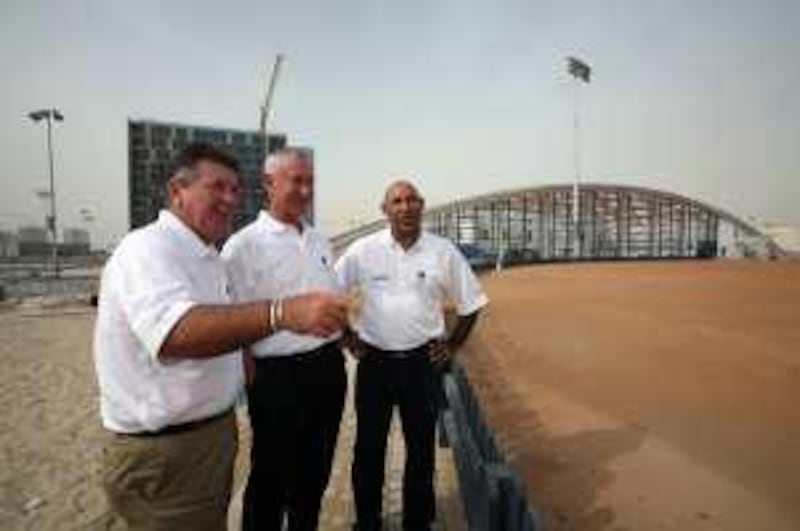DUBAI // The three coaches assigned to improve the standard of cricket in the UAE - as well as the other 103 nations under the sport's global umbrella - made their first appearance together yesterday at the International Cricket Council's Global Cricket Academy (GCA) in Dubai Sports City. There is already a curious dynamic at work among the trio: Rod Marsh, the director of coaching, and his two heads of staff, Mudassar Nazar and Dayle Hadlee.
During their often glorious playing days, there could have been few less likely bedfellows than Marsh, an Australian, Nazar, from Pakistan, and Hadlee. who hails from New Zealand. More than 20 years have passed, yet the competitive spirit has not dulled. Asked to comment on the reported demise of Australian cricket - which he represented with distinction for 14 years - Marsh said: "I could retort to that with a very good answer. But in the present company on my right and left, I probably won't."
The clear implication is that, if Australia are struggling at present, take a look at New Zealand's and Pakistan's results. Other than being hugely well qualified - they have experience of 225 Tests and 198 one-day internationals between them - the trio also clearly represents the polyglot community they will serve. "There is definitely a difference between coaching philosophies," said Hadlee, who has left his job with New Zealand Cricket, where he was in charge of their elite fast bowlers, to move to Dubai.
"The Asian countries tend to say, 'If a bowler is bowling accurately and getting success, why don't we just leave it alone?'. "If they get injured, then they will have a look at the reasons why. A lot of the Asian philosophy is based on developing the body to cope with the action the bowler has. "I think in the European countries it is a little different. They tend to say, 'Here is a model that is biomechanically sound', then they try to fit people into that template. I think there is a fault on that side of the argument."
Marsh knows the three men's views are likely to differ and thinks the resultant hybrid coaching style will be a strength of the academy. "It will be a combination of what we see," added the former wicketkeeper. "We will be using best practice methods, things we have been brought up with. We all come from different backgrounds. I don't think we will alter our style of coaching, other than the fact it will be a combined style.
"We will be using other coaches from all around the world, so those that come here will get a pretty good variety of coaches." The aim of the academy is to help train and develop the best talent in the global game. The coaches will also work with international teams and local players to drive forward the quality of the game in the Emirates. Nazar, 52, a former head coach to Pakistan, already regarded the UAE as his second home before taking up his post in Dubai. He was a member of the Pakistan International Airways team that travelled to Sharjah when the game became established in the emirate in the early 1980s.
"We have already gone a long way to putting together our thoughts on how the academy should deliver its programmes," he said. "I am looking forward to working with elite-level players, but also improving the game from the grass roots." Hadlee, 61, is charged with creating an education programme for coaches, tailored specifically with local schools and grass-roots development in mind. "We are going to need their support to help us to run the programmes that the academy has," he said.
"We are going to need quite an infrastructure of people that can assist us with that. That is going to be my first priority." To judge from the region's biggest youth tournament, the Nissan Gulf Cup, currently taking place in Sharjah and Abu Dhabi with more than 400 players, there is a big appetite for cricket in the UAE. The tournament's director, Shahzad Altaf, believes the game will benefit from the academy's presence, so long as it is fully inclusive.
"It will be good for the game in the UAE, especially if everyone is given an equal chance," said the former UAE bowler, who now runs the Young Talents Cricket Academy. "It cannot just be the people that can afford to go. They have to give a chance to everyone, because some of the boys who are the future of the UAE are not that well-off." Greg Campbell, a PE teacher at Wellington International School in Dubai, added: "Without a doubt, facilities and infrastructure are lacking. Anything they can offer will be beneficial for cricket in this country.
"I just hope their facilities are going to be big enough to cope with the demand, because it is going to be huge." Ironically, the ICC's own flagship coaching academy has to go back to its own parent body to earn official accreditation for its training programmes. Marsh, as its chief of coaching, is on the committee of 10 that considers applications. Yet he will not be able officially to sanction accreditation to the academy.
"We are not reinventing the wheel - we just want to pinch a couple of spokes from it," added Marsh, who has been in the post since Sept 2005. "If a country sends a course for accreditation, I have to read the course, check it is what we have already benchmarked and fits the parameters, then I can pass it." However, he added: "Having looked at some of the other programmes out there, I expect our one will fly through the minimum standard expected by the ICC."
pradley@thenational.ae







